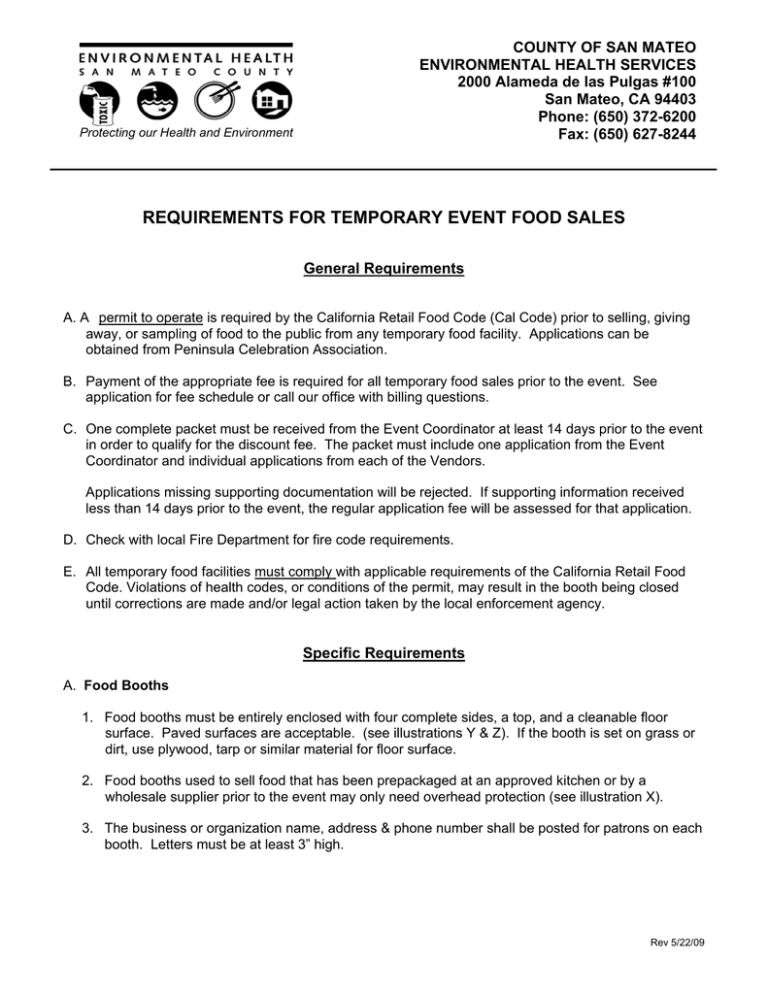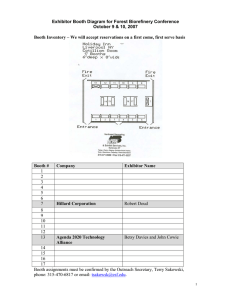Food Booth Requirements
advertisement

Protecting our Health and Environment COUNTY OF SAN MATEO ENVIRONMENTAL HEALTH SERVICES 2000 Alameda de las Pulgas #100 San Mateo, CA 94403 Phone: (650) 372-6200 Fax: (650) 627-8244 REQUIREMENTS FOR TEMPORARY EVENT FOOD SALES General Requirements A. A permit to operate is required by the California Retail Food Code (Cal Code) prior to selling, giving away, or sampling of food to the public from any temporary food facility. Applications can be obtained from Peninsula Celebration Association. B. Payment of the appropriate fee is required for all temporary food sales prior to the event. See application for fee schedule or call our office with billing questions. C. One complete packet must be received from the Event Coordinator at least 14 days prior to the event in order to qualify for the discount fee. The packet must include one application from the Event Coordinator and individual applications from each of the Vendors. Applications missing supporting documentation will be rejected. If supporting information received less than 14 days prior to the event, the regular application fee will be assessed for that application. D. Check with local Fire Department for fire code requirements. E. All temporary food facilities must comply with applicable requirements of the California Retail Food Code. Violations of health codes, or conditions of the permit, may result in the booth being closed until corrections are made and/or legal action taken by the local enforcement agency. Specific Requirements A. Food Booths 1. Food booths must be entirely enclosed with four complete sides, a top, and a cleanable floor surface. Paved surfaces are acceptable. (see illustrations Y & Z). If the booth is set on grass or dirt, use plywood, tarp or similar material for floor surface. 2. Food booths used to sell food that has been prepackaged at an approved kitchen or by a wholesale supplier prior to the event may only need overhead protection (see illustration X). 3. The business or organization name, address & phone number shall be posted for patrons on each booth. Letters must be at least 3” high. Rev 5/22/09 Examples of Food Booths X PACKAGED FOOD BOOTH: (overhead protection ) Fully wrapped food items prepared in an approved food facility. Serving of beverages from approved dispensers Y “50/50” FOOD BOOTH: Fully enclosed rear section for food preparation. Open front section for o Service of fully wrapped food items prepared in the rear. o Serving of beverages from approved dispensers Z FULLY ENCLOSED FOOD BOOTH (may also have a flat roof and alternate openings in front) Full food preparation and service 2 B. Food Preparation & Storage 1. All food served at the event shall be prepared and stored in the booth unless approval of a different site has been obtained from Environmental Health Services. Food Prepared or Stored at Home is Prohibited. C. Temperature Control Shall be provided for potentially hazardous foods. Left over food must be discarded at the end of each day. 1. Cold Food: Maintain temperature of 41º Fahrenheit or below. 2. Hot Food: Maintain food temperature of 135º Fahrenheit or above. (a) The use of Sterno is not recommended to hot hold potentially hazardous foods at outdoor temporary events. Pressurized gas or electric units are suggested alternatives. (b) BBQ’s & other heat producing equipment must be blocked off to prevent access by the public. Thermometer A properly calibrated metal-stem type thermometer (minimum 0-220ºF range) is required at each booth. Hot holding, cold holding, and cooking temperatures need to be monitored throughout the event to verify code compliance and protect the public. D. Transportation During transportation of food to the booth, required temperatures must be maintained and food protected from contamination. E. Hand wash Station A handwash station must be provided in or next to each booth to be used by food handlers. The station must have the following: 1) Insulated container with warm water and a spigot for hands-free washing 2) A catch bucket that is larger than the supply container 3) Pump soap dispenser 4) Paper towels 3 F. Utensil / Equipment Cleaning & Sanitizing Booths used to prepare (cut, cook, assemble) foods shall have a station set up for the cleaning and sanitizing of equipment and utensils. Provide three clean (5) gallon containers (or sized to fit your largest utensil). Sanitizers – Bleach in water sanitizer should consist of 100ppm chlorine (approximately 1 tablespoon of liquid bleach per gallon of water). Soak for at least 30 seconds then air dry. Alternate sanitizers may be used as approved by this Department. G. Wiping Towels - Booths with food preparation require a separate sanitizer container for storage of in-use wiping cloths. Chlorine solution as described above is acceptable. Disposable, single use paper towels permeated with approved sanitizer solution and designed for use in kitchens (such as Clorox wipes) may also be used to sanitize food contact surfaces and utensils. H. Produce Wash Station Additional facilities may be required for the washing of fruits and vegetables prior to preparation. I. Potable Water - An adequate supply of potable (safe for drinking) water shall be provided for utensil washing and hand washing. The water supply shall be from a source approved by the enforcement agency. Ask your Event Coordinator if you should purchase water for use in your booth. J. Food Preparation Surfaces - Must be smooth, easily cleanable and non-absorbent (commercial cutting boards are recommended). K. Waste Water - All waste water must be disposed of into an approved sewage system or holding tank. Do not pour into a storm drain or onto the ground. Ask Event Coordinator for disposal location. L. Food Protection - All food, beverages, equipment and utensils, shall be protected at all times from unnecessary handling and shall be stored, displayed and served so as to be protected from contamination. Food & food packaging materials (i.e. cups, lids, etc.) must be stored off of the ground. M. Condiment Containers - If accessible to the public, shall be the pump type or have self-closing or hinged covers for protection. Single service packets are recommended. N. Food Handlers - Must be in good health and shall wash their hands after visiting the restroom and prior to the start of food preparation. Clean outer garments and hair restraints must be worn. Sanitary food handling techniques must be used at all times. Whenever practical, food handlers shall use tongs, paper wrappers, or single-use gloves. 4 O. Toilet with Hand Washing Facilities - Must be provided within 200 feet of all temporary food facilities. This requirement is in addition to individual hand wash stations at each booth. P. Live animals - Not permitted in temporary food facilities. Q. Ice - If used for refrigerating goods, cannot be used for consumption. R. Smoking and Eating - Prohibited in food booths. S. Garbage Containers - An adequate number of leak-proof and fly-proof garbage containers shall be accessible and serviced as needed. Special Activities in Temporary Food Events A. Food Sampling Booths Vendors who provide samples of any food item (i.e. jelly, honey, salsa, olive oil, etc.) must meet all temporary food event requirements listed in this document, including the following: • • • • • No public direct hand contact of food is allowed. Individually wrapped or pre-portioned servings of food items are recommended. Food samples must be kept behind counter area or protected by sneeze guard. A temporary hand wash facility must be located in booths that prepare and/or dispense open food items. A method of sanitizing utensils must be available in the booth. B. Beverage/Ice Dispensing in Booths Vendors who dispense beverages (soda, beer, wine, etc.) must meet the Temporary Event Hand Wash Requirements. If ice scoops or other utensils are used, a sanitizing container or several extra utensils must also be provided. 5
